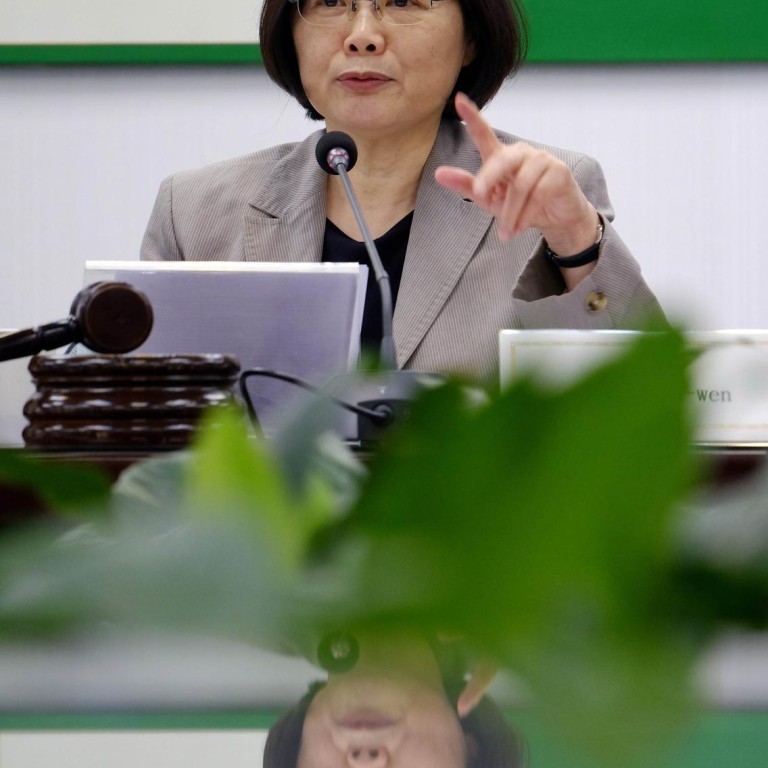
Taiwan's opposition DPP may put independence stance on hold
Move could convince voters the party can calmly steer ties with Beijing in run-up to 2016 election
Taiwan's main opposition party may agree to put its pro-independence stance on hold, paving the way for possible talks with Beijing.
The decision could remove a key challenge for the Democratic Progressive Party (DPP) in the run-up to the presidential election in 2016 - convincing voters it can be trusted to calmly steer cross-strait ties.
Last month as many as 40 DPP delegates endorsed a proposal to "freeze" the party's platform, a key document adopted in 1991 calling for an independent Taiwan, arguing it had already been achieved.
The step would help avoid cross-strait conflicts, build consensus among Taiwanese and help the party return to power following defeat in the presidential polls in 2008 and 2012, delegates said.
DPP chairwoman Dr Tsai Ing-wen, seen as a front runner for 2016, said she believed the idea could be discussed when the party holds its congress next Sunday. "But because the party platform is a very important document of the party, any revision to it needs consensus within the party, and it may take a long time to amend it," Tsai said in a recent background briefing for overseas media.
The platform had been largely superseded by the Resolution on Taiwan's Future adopted by the party in 1999, she said.
The resolution maintains Taiwan doesn't need to declare independence because it is already a sovereign entity. It also states the future of Taiwan must be decided by its residents.
"Actually, the 1999 resolution is a general consensus within the DPP, and to some extent, the consensus of Taiwan society as a whole," she said, in an apparent reference to Taiwanese President Ma Ying-jeou's identification of the island as a sovereign independent country called the Republic of China.
Beijing, which views Taiwan as a renegade province subject to eventual union, insists it will only deal with the DPP if it abandons its pro-independence stance.
Yang Lixian , a researcher at the Institute of Taiwan Studies at the Chinese Academy of Social Sciences, said "freezing" the pro-independence platform would be a step forward by the DPP, but it was too early to say whether a dialogue with the mainland was possible.
"Freezing the platform would not mean the issue of how the DPP identifies cross-strait relations had been resolved," Yang said. "It would not indicate whether the DPP still saw Taiwan as an independent country."
The bottom line for Beijing is that the mainland and Taiwan are not in state-to-state relations, Yang said.
Tsai said she sensed the mainland saw the need to build a relationship with her party, given its position was "much better than in 2012" as voters grow more disappointed with the performance of the Ma administration.
"Placing the wrong bet would be the last thing China would want to do," she said, adding that a DPP win in the year-end local government elections would make Beijing more willing to deal with the party.
Observers said the results of the local polls would be an important gauge of the chances of the Kuomintang and the DPP in 2016. After Tsai lost the presidential election in 2012, she called for the DPP to review its stance towards the mainland. Her defeat was attributed in large part to a failure to convince the public she could maintain stability across the Taiwan Strait.
She has since moved to increase engagement with the mainland, sending over scholars for seminars with their mainland counterparts, and two DPP mayors to open up communication channels.
Tsai did not mobilise any party members or supporters to stage protests during the recent landmark visit to the island of Zhang Zhijun , the director of the Taiwan Affairs Office under the mainland's State Council.
Analysts said it remained to be seen whether the DPP would shelve the platform, but the party is tipped to place more attention on cross-strait issues under Tsai's leadership.
"Tsai, who once headed the Mainland Affairs Council, is well versed in cross-strait affairs and she is expected to seek common ground to achieve consensus within the party over its future cross-strait policy," said Tung Cheng-yuan, a professor at the Graduate Institute of Development Studies at National Chengchi University in Taipei.
However, Shaw Chong-hai, director of the Graduate Institute of Mainland China Studies at Chinese Culture University in Taipei, said the DPP had adjusted only its strategy - not policy - in dealing with the mainland.
"There is actually no breakthrough in either the DPP's [cross-strait] stance or view, although it has become more friendly towards the mainland," Shaw said, referring to the party's stance of "one Taiwan, one China".

